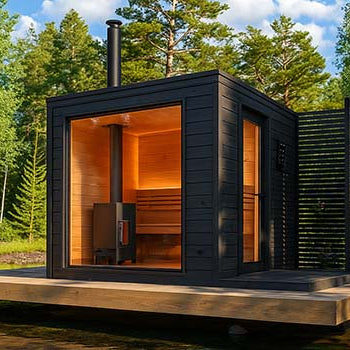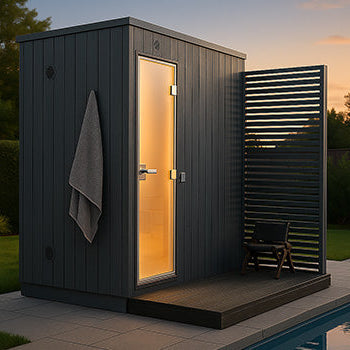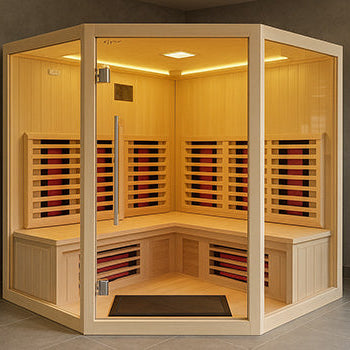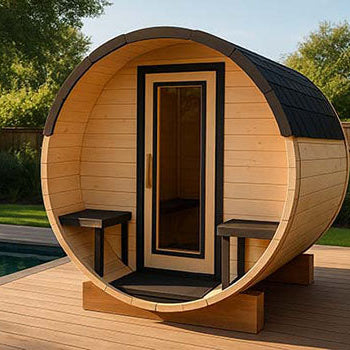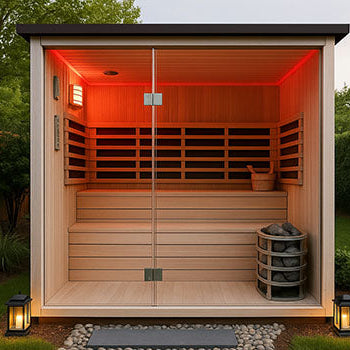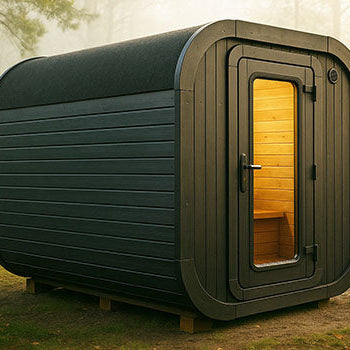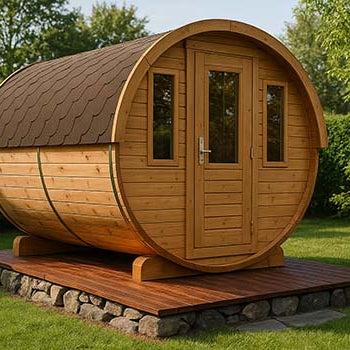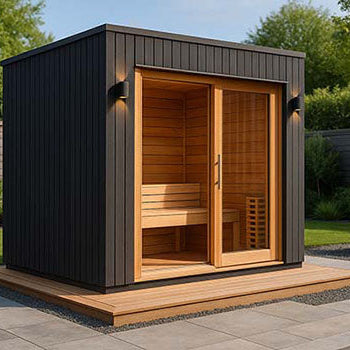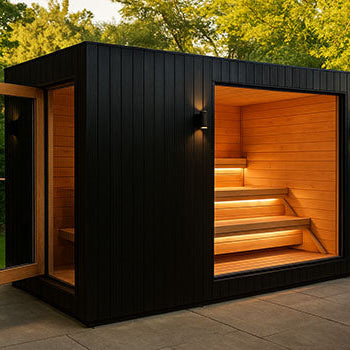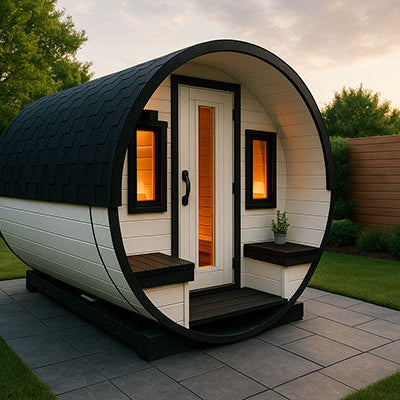Ever stepped out of your cosy backyard outdoor sauna, feeling more like you just walked into a snowstorm? Or maybe you just finished a peaceful indoor sauna session at home, only to find yourself hugging your towel like it's a life raft?
Short answer: Your body’s reacting to the sudden drop in temperature. And it's doing exactly what it's supposed to do. But if the shakes caught you off guard, don’t worry—you’re not alone, and you're not broken.
Keep reading and you’ll get why your body does this (plus how to it from stealing your post-sauna bliss).

Feeling Chilly or Shivery After a Hot Sauna? Here's Why
You expect to leave the sauna all warm and glowy, not like you’re about to start clattering your teeth.
The shift from intense heat to cooler air can feel like a slap of winter, even on a warm day. It’s not just your imagination—your body’s temperature system is working overtime.
These shivers are part of your body's plan to maintain balance.
And when it happens, it’s your system saying, “Hey, I’m trying to stabilise here!”
The Body's Temperature Balancing Act: Thermoregulation
Your body runs like a smart thermostat. When you’re in a sauna, your core temperature rises, your skin gets flushed, and you start sweating like you just ran a marathon.
All of this is controlled by your hypothalamus, the little brain boss behind your body’s internal climate control.
When you suddenly exit the heat, the body shifts gears fast—and not always smoothly.
This bumpy transition can trigger shivering, as your muscles contract to generate heat.
Think of it as your body’s way of warming itself with mini power surges.
The Science Behind Post-Sauna Shivers
This isn’t random—it’s biology doing its thing. And it’s pretty cool once you understand it.
Vasodilation in the Heat: Bringing Blood to the Surface
When you're inside the sauna, your blood vessels open up—this is called vasodilation.
It sends warm blood to your skin's surface so you can sweat and cool off.
It’s why your face turns red and why you feel so toasty all over.
But this warmth is just one half of the temperature rollercoaster.
Vasoconstriction During Cool-Down: Pulling Blood Back Inward
Step outside that sauna, and boom—your body hits reverse.
Your blood vessels constrict, yanking warm blood back toward your core.
This is called vasoconstriction, and it’s your body protecting vital organs from cooling down too fast.
But the skin gets cold quickly, and that’s when the shivers roll in.
It’s not broken—it’s just doing its best to cope.
Rapid Temperature Shifts and the Shivering Response
Shivering happens when your body’s thermal control panel gets overwhelmed by a quick change.
You were baking one minute, and now you're cooling way too fast.
Your muscles start twitching involuntarily to generate more heat.
It’s not pleasant, but it’s effective—just a little over-the-top.
Like your body saying, “Let’s turn the heater on—full blast!”
Potential Thermoregulation Overshoot (The "After-Drop")
Ever felt colder 10 minutes after you left the sauna?
That’s what some call the “after-drop.”
Your core keeps cooling down even though the heat is gone.
It’s a rare but real phenomenon, and it can make post-sauna chills feel worse than expected.
The body’s overshoot might be uncomfortable, but again, totally normal.
Is Feeling Shivery After Sauna Normal or Concerning?

Usually a Temporary Physiological Response
Let’s make this clear—shivering after sauna is normal for most people.
It usually fades within a few minutes.
Think of it like jet lag for your skin—it needs time to catch up with the shift.
Unless it sticks around or comes with other symptoms, it’s just your body doing its best.
So don’t panic. Just grab a fluffy robe and ride it out.
When to Be Concerned (Persistent Chills, Other Symptoms)
If the shivers won’t stop or come with things like dizziness, weakness, or nausea, that’s a red flag.
You might be dehydrated, low on electrolytes, or pushing your body too hard.
Some people are more sensitive to heat and temperature swings.
Listen to your body—it usually whispers before it yells.
If in doubt, check in with your GP.
Tips to Minimize Post-Sauna Chills
Gradual Cool-Down Methods
Don’t go from blazing heat to icy air in 30 seconds.
Let your body adjust slowly. Use a lukewarm shower, or step into a warm room before braving the cooler air.
Think of it like cooling a pie—slow and gentle is the way to go.
Sudden exposure just shocks the system.
Avoid the cold plunge unless your body’s ready.
Ensuring You're Properly Dry and Warm After Cooling
Water evaporates fast—and that can suck heat right out of your body.
After sweating it out, dry off completely and wrap up in something cosy.
Don’t lounge around in damp clothes or wet skin.
You’ve earned a robe, blanket, or even fuzzy socks.
Your warmth matters just as much as your wellness glow.
Staying Hydrated
You sweat a ton in the sauna, and all that fluid has to be replaced.
Dehydration messes with everything—especially your temperature control.
Sip on water before, during, and after your session.
If you’ve gone for a longer heat stint, add some electrolytes too.
Hydrated bodies regulate better, period.
Conclusion: Understanding Your Body's Reaction to Temperature Extremes

Your body is amazing—it just gets a little dramatic about temperature changes.
Those post-sauna shivers? They’re your body recalibrating, not malfunctioning.
Whether you love the quiet heat of an indoor sauna retreat or enjoy the rustic vibe of your outdoor sauna setup, chills can happen.
But now that you know why, you’re better equipped to handle them.
Stay warm, stay hydrated, and give your body time to catch its breath.
Because the more you understand it, the more your sauna sessions can shift from “why am I shivering?” to “ah, I’ve got this.”
